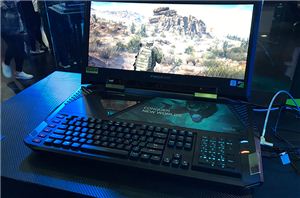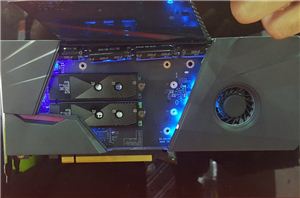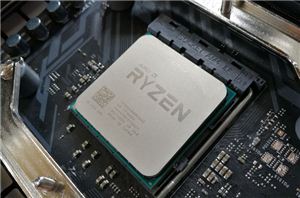Plextor Demonstrates 4-Way M9Pe Extreme SSD Solution: Up to 6.5 GB/s
by Anton Shilov on June 12, 2018 1:00 PM EST- Posted in
- SSDs
- Trade Shows
- M.2
- NVMe
- Plextor M9Pe
- Computex 2018

Having worked with Marvell for many years, Plextor is tied closely to Marvell’s controller ecosystem since its proprietary firmware technologies rely on capabilities of the said controllers. In recent years Plextor has been struggling to offer competitive performance in the high-end segment of the market primarily because Marvell’s Marvell 88SS1093 "Eldora" controller is a few years old. In a bid to regain some of the ground it lost to rivals, Plextor is planning to offer a rather unbeatable solution: a drive running four M9Pe M.2 SSD modules in RAID 0 mode.
Plextor demonstrated the prototype 4-way SSD backplane based on Marvell’s 88NR2241 PCIe switch at Computex. The switch has a PCIe 3.0 x8 interface on one side and four PCIe 3.0 x4 interfaces on another, thus supporting up to four PCIe 3.0 x4/NVMe drives without the necessity to bifurcate PCIe lanes by the CPU/PCH. Evidently, limiting the bus width to x8 confines maximum theoretical performance of four PCIe 3.0 x4 SSDs, but it also maximizes compatibility with mainstream platforms that have a limited number of PCIe lanes and constrained bifurcation capabilities.
Speaking of performance, Plextor’s numbers indicate that the quad M9Pe 1 TB SSD array can offer up to 6500 MB/s sequential write speed as well as 5000 MB/s sequential read speed, which is well above the levels offered by consumer drives available today. Meanwhile, in addition to RAID 0 (stripe), the backplane will also support RAID 1 (mirror) mode for reliability. Obviously, four 1 TB drives do not come cheap, so Plextor’s ‘Extreme’ solution is clearly not aimed at the mass market.
Plextor’s backplane is still a work in progress and the company does not expect to launch it before the end of 2018, or perhaps even early 2019. As you can see from the pictures, the backplane is rather bulky, so Plextor’s task is to make it more compact and also to cool down SSDs with hot controllers. Good news is that once the backplane is fully developed, it can be used for virtually any SSD and Plextor will be able to offer ultra-speedy solid-state storage solutions with its upcoming drives in the future (say, drives based on Marvell’s latest NVMe controllers).
Plextor’s backplane will certainly not be the only product of this kind. Numerous manufacturers, including ASUS, ASRock, HP, and others, offer similar solutions, but without PCIe switches. Such backplanes have to use CPU/PCH PCIe lanes bifurcation, which limits compatibility with business/mainstream platforms that have a limited number of PCIe lanes and confined bifurcation capabilities in some cases.
| Want to keep up to date with all of our Computex 2018 Coverage? | ||||||
 Laptops |
 Hardware |
 Chips |
||||
| Follow AnandTech's breaking news here! | ||||||













11 Comments
View All Comments
cygnus1 - Tuesday, June 12, 2018 - link
Any indication if the "backplane" card will support transparent passthru of the nvme devices? Would be really cool if it did for non-enterprise uses that need raw access to the individual disks (home ZFS servers for me).rahvin - Tuesday, June 12, 2018 - link
They've got a controller chip and probably a bridge chip, there is very little chance they could pass that through transparent with those in between.jordanclock - Tuesday, June 12, 2018 - link
The PCIe switch means that it would appear as a single monolithic storage device to the OS.If you really need direct drive access, you'll want to look into the options that use bifurcation and are already available.
MajGenRelativity - Tuesday, June 12, 2018 - link
I agree with the above comment. I believe Applicata has a x16 slot card that may meet your needsCharlie22911 - Tuesday, June 12, 2018 - link
Not necessarily, I’ve got a quad port Intel NIC in my server that uses a PCIe x4 switch to connect two separate dual port chipsets; I can most certainly pass each chipset through to a VM separately.Mikewind Dale - Tuesday, June 12, 2018 - link
Yeah, the point of this device is precisely *not* to be transparent. It has its own PCIe switch, so that the host computer doesn't have to bifurcate its PCIe among 4 drives. To the host, this device looks like one giant drive.So there are advantages and disadvantages. One advantage, I think, is that the RAID is hardware rather than software.
Billy Tallis - Tuesday, June 12, 2018 - link
My understanding from talking with Marvell about the NVMe switch when they announced it earlier this year is that it can either do RAID-0/1/10 or present the drives as individual namespaces of the virtualized NVMe controller. The latter would be appropriate for giving ZFS and similar systems direct control over what gets stored on each physical SSD.Hereiam2005 - Wednesday, June 13, 2018 - link
A Trenton HDB8231 and a SBC will get you 18 PCIE slots, and cost no more than 1500$ at most.tyger11 - Tuesday, June 12, 2018 - link
I've been waiting for someone to put out an NVMe m.2 SSD-based DAS for a while now. Still surprised it hasn't happened.